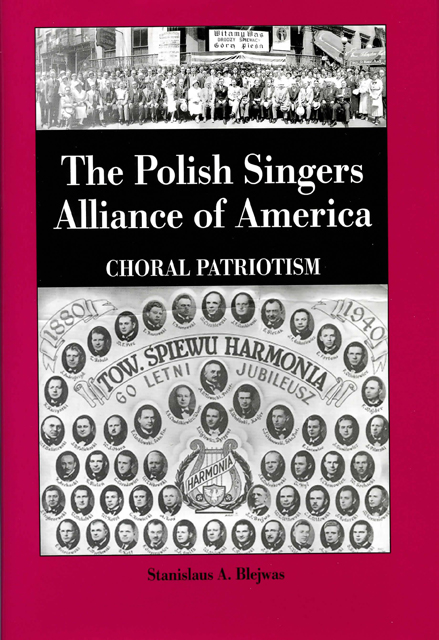Book contents
- Frontmatter
- Contents
- List of Illustrations
- Foreword
- Acknowledgments
- Introduction
- 1 “To Sing Out the Future of Our Beloved Fatherland”
- 2 Pieśni o ziemi naszej (Songs of Our Land)
- 3 The Convention of “Unhappy Memory”
- 4 “Active Duty”
- 5 “Cultural Care”
- 6 World War II and a New Immigration
- 7 The Czechlewski Years: The Ideological Organization Redefined
- 8 Polish American Choral Culture
- 9 “Let Poland Be Poland!”
- 10 Quo Vadis Polish Song in North America?
- Appendix A PSAA National Officers
- Appendix B National Conventions
- Appendix C Individual Choirs
- Appendix D Honorary Members
- Appendix E Compositions of Antoni Małłek Celebrating the Holy Trinity Immigrant Neighborhood in Chicago
- Appendix F Membership
- Appendix G Hlond Trophy Winners
- Appendix H Children’s Choirs
- Appendix I Selected Biographies
- Appendix J Competition Songs, Winning Choirs, and Free Selection at National Conventions of the Polish Singers Alliance of America
- Appendix K Guest Artists and Selections Performed at National and International Conventions of the Polish Singers Alliance of America, 1905–1998
- Appendix L Songs Sung by Choirs at Concerts of the National and International Conventions of the Polish Singers Alliance of America
- Appendix M PSAA Districts and Choirs—1999
- Notes
- Bibliography
- Index
4 - “Active Duty”
Published online by Cambridge University Press: 17 March 2023
- Frontmatter
- Contents
- List of Illustrations
- Foreword
- Acknowledgments
- Introduction
- 1 “To Sing Out the Future of Our Beloved Fatherland”
- 2 Pieśni o ziemi naszej (Songs of Our Land)
- 3 The Convention of “Unhappy Memory”
- 4 “Active Duty”
- 5 “Cultural Care”
- 6 World War II and a New Immigration
- 7 The Czechlewski Years: The Ideological Organization Redefined
- 8 Polish American Choral Culture
- 9 “Let Poland Be Poland!”
- 10 Quo Vadis Polish Song in North America?
- Appendix A PSAA National Officers
- Appendix B National Conventions
- Appendix C Individual Choirs
- Appendix D Honorary Members
- Appendix E Compositions of Antoni Małłek Celebrating the Holy Trinity Immigrant Neighborhood in Chicago
- Appendix F Membership
- Appendix G Hlond Trophy Winners
- Appendix H Children’s Choirs
- Appendix I Selected Biographies
- Appendix J Competition Songs, Winning Choirs, and Free Selection at National Conventions of the Polish Singers Alliance of America
- Appendix K Guest Artists and Selections Performed at National and International Conventions of the Polish Singers Alliance of America, 1905–1998
- Appendix L Songs Sung by Choirs at Concerts of the National and International Conventions of the Polish Singers Alliance of America
- Appendix M PSAA Districts and Choirs—1999
- Notes
- Bibliography
- Index
Summary
The period from the turn of the century up to the outbreak and through to the end of World War I was a time of growth and excitement for the immigrant Polish community in America. This was the zenith of the Great Peasant Emigration from the Polish lands. Emigration across the Atlantic to North America, now primarily from Russian and Austrian Poland, peaked. According to the annual reports of the Immigration and Naturalization Service, 1,059,043 Polish immigrants arrived between 1889 and 1919. While the number may be an undercount, the available information confirms that the new arrivals were largely rural peasants. They settled in the older immigrant communities of the Midwest, but also established their presence in other regions, including the Middle Atlantic states and in southern New England. While most lacked a formal education, they knew why they were leaving their native villages, they knew their destination, and they intended to improve their economic situation once they found a place of residence and work.
A small influx of political émigrés accompanied the economic immigrants. This was a consequence of increasing political turmoil in the Russian and Austrian Empires, especially the Revolution of 1905. The arrival of a new generation of émigrés and the developments in partitioned Poland intensified homeland politics within the immigrant community in America. Adherents of Polish political currents competed with each other for influence among the immigrants and their organizations. The outbreak of the Russo-Japanese War in 1904 and the revolutionary events that swept the Russian Empire and the Kingdom of Poland in 1905 and 1906 provoked an intense debate within American Polonia as to how to respond. Polish socialists, whose influence was ascending within the Polish National Alliance, exhorted American Polonia to abet the revolution. The PNA, however, temporized, ultimately adopting the conciliatory line advanced by Roman Dmowski's National Democratic Party.
These debates were a reflection of the increasing politicalization of the immigrant community for homeland politics, i.e., the restoration of Polish independence. However, while immigrant nationalists and socialists sought to draw attention to the immigration's importance in homeland politics as the “fourth partition,” immigrant leaders also sought to attract attention to the community's presence in America.
- Type
- Chapter
- Information
- The Polish Singers Alliance of America 1888-1998Choral Patriotism, pp. 50 - 63Publisher: Boydell & BrewerPrint publication year: 2005

